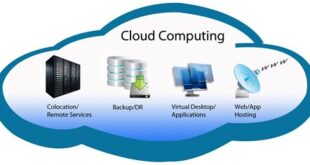
Benefits of Cloud Computing
Cloud computing has revolutionized the way businesses and individuals store, access, and manage their data. By utilizing remote servers hosted on the internet, cloud computing offers numerous advantages that enhance efficiency and productivity. In today’s fast-paced digital world, embracing cloud computing services has become essential for organizations and individuals seeking a competitive edge.
When it comes to cloud computing, one of the key benefits is cost savings. Traditional on-premise infrastructure requires significant upfront investments in hardware, software, and maintenance. With cloud computing, these expenses are greatly reduced as businesses can access resources on a pay-as-you-go basis. This eliminates the need to invest in costly infrastructure, helping companies allocate their budgets more efficiently.
In addition to cost savings, cloud computing offers unparalleled scalability. Businesses can easily scale up or down their computing resources based on their needs. During peak periods, such as holiday seasons or product launches, organizations can instantly increase their server capacity to handle the influx of traffic. Conversely, during quieter periods, they can scale down to optimize cost efficiency. This flexibility ensures that businesses only pay for the resources they actually use.
Another advantage of cloud computing is improved accessibility. Cloud services allow users to access their data and applications from anywhere with an internet connection. This means that employees can collaborate on projects in real-time, regardless of their location. It eliminates the need for employees to be physically present in the office, enabling remote work and improving work-life balance. Additionally, individuals can also access their personal files and applications on various devices, making cloud computing a convenient solution for both work and personal use.
Data security is a paramount concern for businesses, and cloud computing addresses this issue effectively. Cloud service providers invest heavily in security measures to protect sensitive data against cyber threats. They utilize encryption and authentication protocols to ensure data confidentiality and integrity. Furthermore, cloud providers have redundancies in place, meaning that if one server fails, data is automatically replicated onto another server, reducing the risk of data loss. These comprehensive security measures offered by cloud computing providers give businesses peace of mind and allow them to focus on their core operations.
Cloud computing also enables seamless collaboration and innovation. With cloud-based tools and platforms, teams can collaborate on projects in real-time, regardless of their physical location. This promotes teamwork, boosts creativity, and accelerates innovation. Moreover, cloud computing enables businesses to quickly experiment with new technologies, such as artificial intelligence or big data analytics, without the need for significant investments upfront. This fosters a culture of continuous improvement and keeps businesses at the forefront of technological advancements.
Furthermore, cloud computing ensures disaster recovery and business continuity. Traditional methods of backing up data, such as physical servers or external hard drives, are subject to risks such as hardware failure, theft, or natural disasters. Cloud computing eliminates these concerns by automatically backing up data in secure off-site locations. In the event of a disaster, businesses can quickly recover their data and resume operations, minimizing downtime and financial losses.
In conclusion, cloud computing offers a multitude of benefits for businesses and individuals. From cost savings and scalability to improved accessibility and data security, cloud computing has become an indispensable tool in today’s digital landscape. By embracing cloud services, organizations can streamline their operations, enhance collaboration, and stay ahead of the competition. Whether it’s a small startup or a large enterprise, harnessing the power of cloud computing is crucial for success in the modern world.
One of the core components of cloud computing is the cloud infrastructure. This infrastructure includes servers, storage devices, networks, and software that form the foundation for running applications and delivering services in the cloud.
Security in Cloud Computing
Cloud computing has revolutionized the way businesses operate, providing an efficient and cost-effective solution for data storage and processing. However, with the vast amount of sensitive information being stored in the cloud, security concerns have emerged as a significant challenge. Addressing these concerns is crucial to building trust and ensuring the integrity and confidentiality of data in the cloud.
One of the main concerns surrounding cloud computing security is the risk of unauthorized access to data. With data being stored and processed on remote servers, there is always the possibility of malicious actors gaining unauthorized entry. To mitigate this risk, cloud service providers implement various security measures such as encryption, strong access controls, and multi-factor authentication. By securing data at rest and in transit, these measures ensure that even if unauthorized access occurs, the data remains protected.
Another aspect of security in cloud computing is the concern over data breaches. Data breaches can have severe consequences for businesses, leading to reputational damage and financial losses. Cloud service providers invest heavily in state-of-the-art security systems to prevent and detect data breaches. They continuously monitor the network for any suspicious activities, promptly applying patches and updates to address vulnerabilities. Additionally, regular security audits and assessments are conducted to identify and rectify any potential weaknesses in the system.
Furthermore, the integrity and confidentiality of data in the cloud are safeguarded through rigorous access controls. Cloud service providers implement role-based access control mechanisms, ensuring that only authorized individuals have the necessary permissions to access sensitive information. This helps prevent unauthorized modification or deletion of data, reducing the risk of data tampering and loss.
Moreover, cloud computing security also includes measures to protect against data loss. Although cloud service providers employ robust backup and disaster recovery mechanisms, there is still a possibility of data loss due to unforeseen circumstances. Providers undertake regular backup procedures to ensure data redundancy, allowing for prompt recovery in case of any data loss. Additionally, data encryption during transit and storage adds an extra layer of protection against data loss or theft.
Finally, compliance with industry regulations and standards is crucial to maintaining the security of data in cloud computing. Cloud service providers adhere to stringent regulatory requirements, such as the General Data Protection Regulation (GDPR), to protect the privacy and confidentiality of user data. By following these regulations and undergoing regular audits, providers ensure that they operate within the legal framework, offering enhanced security and peace of mind to their customers.
In conclusion, the security of data stored and processed in the cloud is of utmost importance in the realm of cloud computing. Addressing concerns related to unauthorized access, data breaches, access controls, data loss prevention, and regulatory compliance is crucial for building trust in cloud-based solutions. By implementing robust security measures, cloud service providers strive to offer a secure and reliable environment for businesses to store and process their valuable data.
When it comes to cloud technology, cloud services play a crucial role. These services are designed to provide various computing resources such as servers, storage, and databases, enabling organizations to scale their operations efficiently.
Challenges in Cloud Computing
Cloud computing, a technological marvel of the digital age, has revolutionized the way businesses and individuals store and process data. This innovative approach allows for the storage and retrieval of digital assets remotely, eliminating the need for physical servers or infrastructure. However, like any other technological advancement, cloud computing is not without its challenges. Let us delve into the potential obstacles and limitations faced by users and service providers in this dynamic industry.
1. Cybersecurity Concerns: In an interconnected world, the safety and security of data is paramount. Cloud computing, being a network-based service, brings with it concerns about unauthorized access, data breaches, and vulnerabilities. With valuable information stored remotely, users and service providers must implement robust security measures to protect against cyber threats.
2. Reliability and Downtime: While cloud computing offers vast storage and computing capacities, it is not immune to technical difficulties. The reliability of cloud service providers is a crucial concern since any downtime can disrupt operations, leading to loss of productivity and potential revenue. To mitigate these risks, service level agreements (SLAs) are put in place to ensure providers maintain a high level of availability.
3. Compliance and Legal Issues: Enterprises operating in regulated industries such as healthcare and finance face compliance challenges in storing and processing sensitive data in the cloud. Privacy laws and regulations may restrict the geographic locations where data can be stored and may require specific security measures to be in place. Service providers must adhere to these regulations to ensure their clients remain compliant.
4. Vendor Lock-In: Transitioning from one cloud service provider to another can be complex and costly. The integration of business-critical applications and data into a specific provider’s infrastructure can create dependencies, making it difficult to switch vendors. It is essential for organizations to proactively consider potential vendor lock-in and ensure compatibility and portability of their data.
5. Scalability Challenges: While the cloud offers scalability to accommodate changing business needs, improper planning can lead to under or over-provisioning of resources. Organizations must accurately assess their requirements to avoid unnecessary costs or insufficient computing capabilities. Implementing automated scaling mechanisms and monitoring tools can assist in achieving optimal resource utilization.
6. Data Governance and Loss: Entrusting data to a third-party service requires a comprehensive understanding of the provider’s data governance policies. Organizations must have assurance that their data is subject to appropriate backup, retention, and disaster recovery practices. Backup mechanisms, redundant storage systems, and data replication are crucial elements that cloud service providers must adhere to safeguard against data loss.
Addressing these challenges requires collaboration between cloud service providers and users. The industry must continually adapt and evolve to meet the demands of an ever-changing technological landscape while prioritizing the privacy and security of data. As cloud computing continues to shape the digital ecosystem, it will be the collective effort of stakeholders that enables its potential to be fully harnessed.
To ensure the success of a cloud implementation, it is essential to choose the right cloud solutions. These solutions offer a range of services and tools that enable businesses to optimize their operations, improve productivity, and reduce costs.
Future Trends in Cloud Computing
Cloud computing has revolutionized the way businesses store, manage, and process data. With its ability to provide scalable and accessible computing resources, the cloud has become an essential tool for organizations of all sizes. As technology continues to evolve, the future of cloud computing holds exciting possibilities. Let’s delve into the emerging trends that are shaping the future of cloud computing and discover what lies ahead.
1. Edge Computing: One of the significant trends on the horizon is edge computing. As the volume and variety of data generated by devices at the edge of a network increase, processing this data in the cloud may become less efficient. Edge computing enables data processing and analysis to occur closer to the source, reducing latency and improving real-time capabilities. With the proliferation of Internet of Things (IoT) devices, edge computing is set to play a critical role in optimizing cloud computing operations.
2. Artificial Intelligence and Machine Learning: The integration of artificial intelligence (AI) and machine learning (ML) technologies with cloud computing is another trend to watch out for. These technologies provide advanced data analysis and automation capabilities that can significantly enhance cloud computing performance. From intelligent resource allocation to predictive analytics, AI and ML are set to revolutionize how businesses leverage the cloud for achieving their objectives.
3. Hybrid Cloud Solutions: Many organizations are adopting a hybrid cloud approach, combining public and private clouds to meet their specific needs. This trend is driven by the flexibility and scalability that hybrid solutions offer. Businesses can retain control over sensitive data by keeping it on a private cloud while leveraging the scalability and cost-effectiveness of public cloud services. The ability to seamlessly integrate and manage applications across hybrid environments is becoming a crucial aspect of modern cloud computing strategies.
4. Serverless Computing: Serverless computing, also known as Function as a Service (FaaS), eliminates the need for developers to manage servers and infrastructure. Instead, developers can focus solely on writing code, which is executed in response to specific events or triggers. Serverless computing provides an efficient and cost-effective way to run applications in the cloud. With its ability to auto-scale and handle sudden demand spikes, serverless computing offers greater flexibility and reduced operational overhead.
5. Containerization: Containers have gained significant popularity in recent years due to their lightweight and portable nature. Containerization allows applications to be packaged along with their dependencies, ensuring consistency across different computing environments. This trend enables easier deployment and management of applications in the cloud, fostering efficient resource utilization and better collaboration between development and operations teams.
6. Blockchain and Cloud Integration: Blockchain technology, primarily known for its association with cryptocurrencies, is finding its way into the cloud computing landscape. The integration of blockchain and cloud computing can provide enhanced security, transparency, and traceability for various applications. By decentralizing control and ensuring data integrity, blockchain can address the trust and security concerns associated with cloud computing, opening up new possibilities for secure and reliable data storage and transactions.
7. Green Cloud Computing: As environmental concerns become increasingly prominent, the focus on green cloud computing is gaining momentum. By optimizing energy consumption and resource utilization, organizations can reduce their carbon footprint and contribute to sustainability efforts. The future of cloud computing involves building eco-friendly data centers, utilizing renewable energy sources, and implementing energy-efficient practices to create a greener and more sustainable cloud infrastructure.
The future of cloud computing is indeed promising, with emerging trends pushing the boundaries of what is possible. As edge computing, AI and ML integration, hybrid cloud solutions, serverless computing, containerization, blockchain integration, and green cloud computing continue to evolve, businesses across all sectors can expect more efficient, scalable, and environmentally conscious cloud technologies.
Cloud computing is a key concept in today’s digital world. Cloud computing allows businesses and individuals to store and access data and programs over the internet, rather than relying on physical hardware.
 Cloud Solution All Cloud Information
Cloud Solution All Cloud Information








